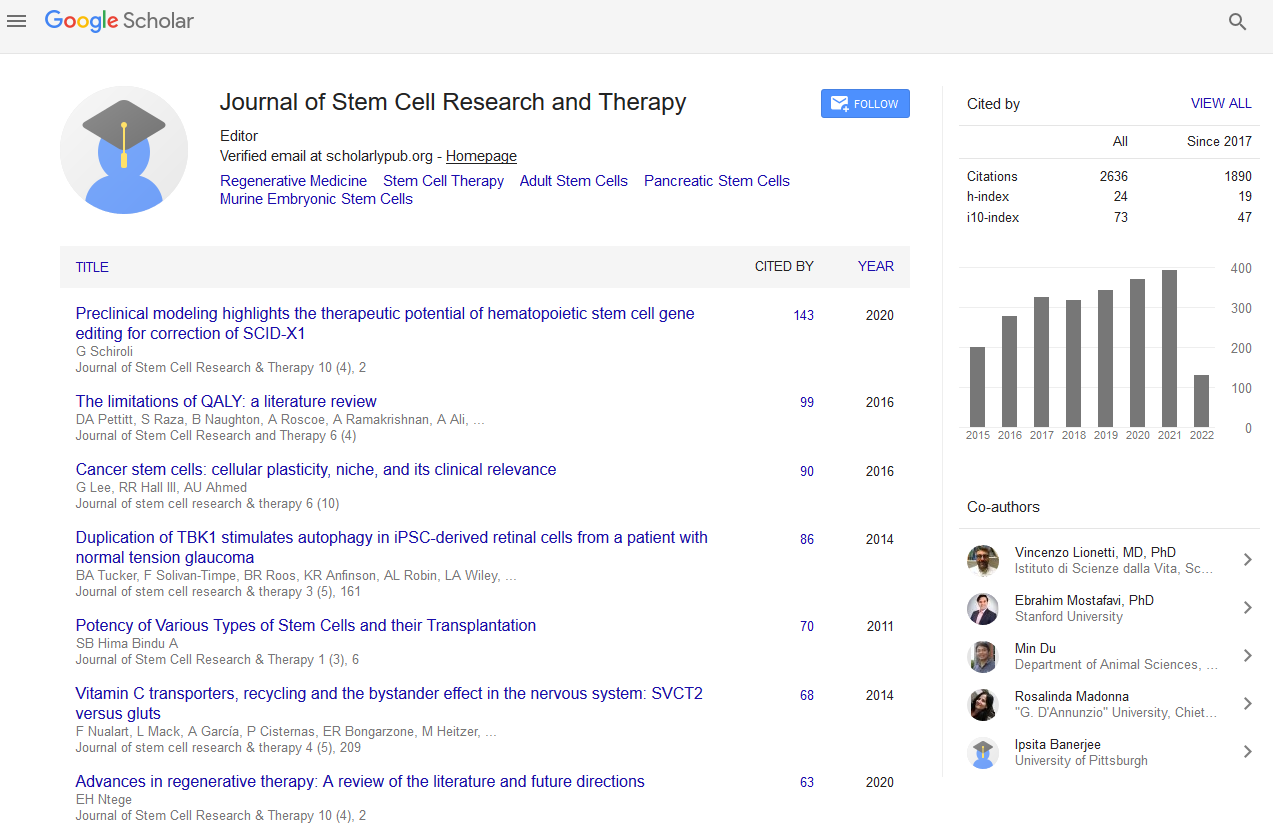Indexed In
- Open J Gate
- Genamics JournalSeek
- Academic Keys
- JournalTOCs
- China National Knowledge Infrastructure (CNKI)
- Ulrich's Periodicals Directory
- RefSeek
- Hamdard University
- EBSCO A-Z
- Directory of Abstract Indexing for Journals
- OCLC- WorldCat
- Publons
- Geneva Foundation for Medical Education and Research
- Euro Pub
- Google Scholar
Useful Links
Share This Page
Journal Flyer

Open Access Journals
- Agri and Aquaculture
- Biochemistry
- Bioinformatics & Systems Biology
- Business & Management
- Chemistry
- Clinical Sciences
- Engineering
- Food & Nutrition
- General Science
- Genetics & Molecular Biology
- Immunology & Microbiology
- Medical Sciences
- Neuroscience & Psychology
- Nursing & Health Care
- Pharmaceutical Sciences
The effectivity of novel mesenchymal stem cell therapy in graft-versus-host disease
7th International Conference and Exhibition on Cell and Gene Therapy
March 15-16, 2018 | London, UK
E Molnar, A Barta, A Batai, Z Csukly, Z Farkas, L Gopcsa, G Tatai, G Kovacs, L Lengyel, T Masszi, G Mikala, M Paksi, M Reti, E Torbagyi, H Andrikovics, H Bonig, P Bader and P Remenyi
Hungarian National Blood Transfusion Service, Hungary
St. Istvan and St. Laszlo Hospital, Hungary
Semmelweis University, Hungary
Hospital Frankfurt, Germany
Scientific Tracks Abstracts: J Stem Cell Res Ther
Abstract:
Steroid-refractory graft-versus-host disease (GvHD) is a serious complication of allogeneic hematopoietic stem cell transplantation (HSCT) with limited treatment options. We evaluated the efficacy of mesenchymal stem cell (MSC) transfusions in GvHD refractory to conventional treatments. Patients with steroid-resistant GvHD were treated with novel MSC products (derived from 8 bone marrow donors, ��?MSC-FFM� generated by University of Frankfurt am Main, Germany), 4 times weekly at a dose of 1 million cells/kg. 12 patients received 13 cycles (4 doses/cycle). The median age was 47 (19��?56) years, with a male to female ratio of 1:2. Nine patients had allo-HSCT with matched unrelated donors and three with HLAidentic relatives. GvHD was observed on median 63rd (7��?455) day after HSCT. The involved organs were skin (2), gut (4), skin and gut combined (7) and lung in three cases. The median time of MSC��?s first infusion was 274 (114��?1981) days after HSCT and 165 (19-1974) days after GvHD onset. Four of the 13 MSC-cycles (30.8%) led to complete and seven (53.8%) resulted in partial remission. GvHD NIH stage score before MSC infusions was three in all cases, which decreased to a median of one after treatment. The overall survival on the 180th day after GvHD onset was 75%. Red blood cell concentrate requirement was reduced from an average of 12.83 to 8.92 (30.5%) and platelet concentrate need from 107.17 to 50.75 (52.6% reduction) after MSC treatment. In summary, MSC-FFM product is an effective, promising alternative treatment for GvHD with 83% response rate.
Biography :
E Molnar was awarded PhD from Semmelweis University, Budapest in the year 2017. He holds a Master’s Degree (MSc) in Medicine Development from Semmelweis University, Budapest, followed by a Bachelor’s Degree (BSc) in Business and Management from Corvinus University, Budapest. He has extended his valuable service in Healthcare from 2008 till date and has been a recipient of many award and grants. Currently, he is working as a Medical Fellow/Attending Physician for the Hungarian National Blood Transfusion Service. His international experience includes various programs, contributions and participation in different countries for diverse fields of study. His research interests reflect in his wide range of publications in various national and international journals.
Email:meisterwerke@gmail.com


